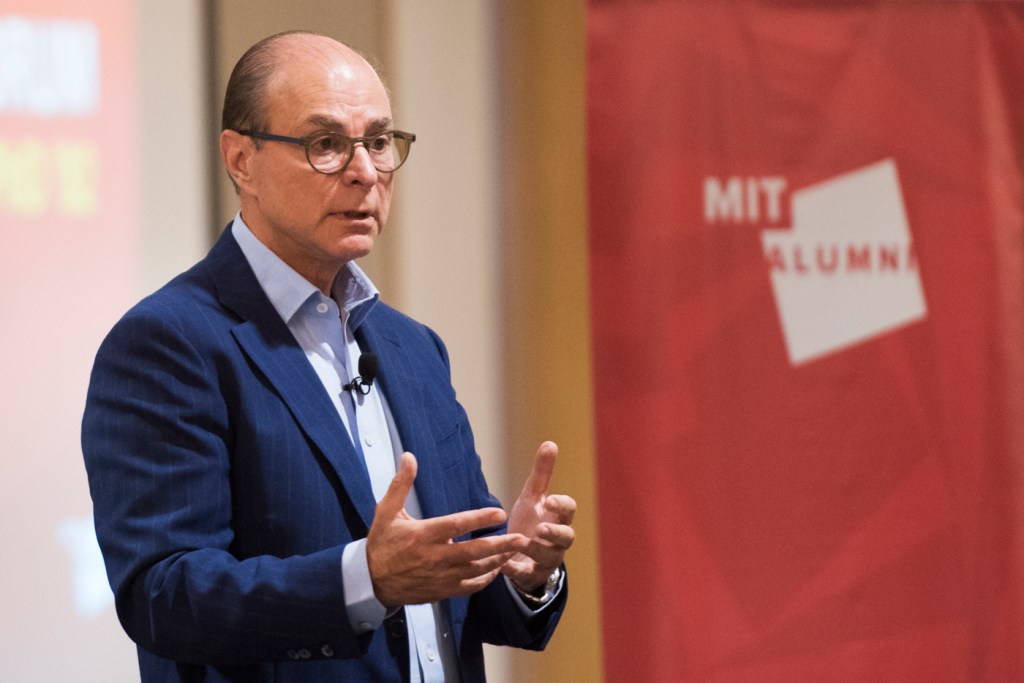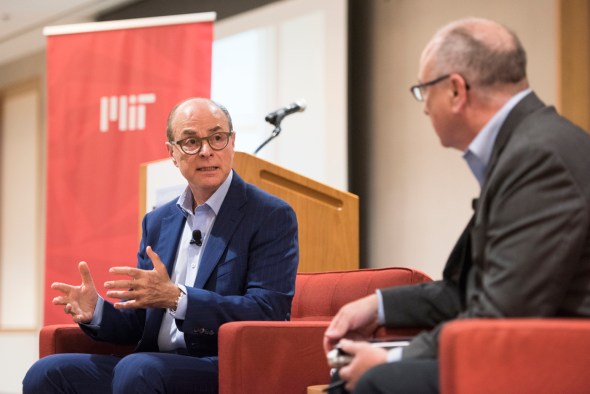Robot-Proof: President Aoun outlines plan for reinventing higher ed in the AI age

In a talk Tuesday night at the Massachusetts Institute of Technology, Northeastern President Joseph E. Aoun said everyone in the audience would one day find their jobs obsolete—unless they dedicate themselves to lifelong learning.
Aoun, who served as the keynote speaker at the MIT Alumni Association Fall Forum event, has explored this topic extensively. His new book, Robot Proof: Higher Education in the Age of Artificial Intelligence, unveils a framework for universities to train the next generation of creators, rather than laborers, by enhancing skills that are innately, and uniquely, human.
The impetus for the book was a realization that robotics and artificial intelligence are advancing more rapidly than anyone predicted. Even scientists appear to be caught off-guard by the sudden and unprecedented capabilities of their creations. These technological advances have vast implications, especially for the future of work. Some studies predict that half of all U.S. jobs will be at risk within the next 20 years, Aoun said.
“Machines are smart and getting smarter,” he said. “More jobs are going to disappear and new jobs will be created. We need to meet these challenges.”
Society is changing, the world is changing, and I believe higher ed has the responsibility and opportunity to make every learner robot-proof.
Joseph E. Aoun
President, Northeastern University
His plan? Cultivate the best of what it means to be human. Aoun has proposed a new comprehensive curriculum based on a field he calls humanics—the human equivalent of robotics—which is defined by the mastery of three literacies: technological literacy, data literacy, and human literacy—the third referring to qualities computers can’t replicate, no matter how smart they become.
If fact, it’s those human literacy skills—creativity, entrepreneurship, systems thinking, empathy, cultural agility, and teamwork—in combination with training in cybersecurity and Big Data, that employers say they want. And higher education institutions have a responsibility to deliver, Aoun said.
That means integrating lifelong learning into the curriculum and catering to a spectrum of students. Aoun explained that there are two types of learners—those who are “short on experience and long on time,” and those who are “long on experience and short on time.” Each group has distinct educational needs.

In a talk Tuesday night at the Massachusetts Institute of Technology, Northeastern President Joseph E. Aoun said everyone in the audience would one day find their jobs obsolete—unless they dedicate themselves to lifelong learning.
Photo by Adam Glanzman/Northeastern University
Experiential education will be critical at every level. Northeastern is already a leader in this area, particularly due to its signature co-op program. In fact, Northeastern has placed students in experiential learning opportunities in 136 countries since 2006 under Aoun’s leadership. Experiential learning will be even more of a focus in the future, Aoun said, as co-op and internship programs expand throughout every academic level, including doctoral education. Northeastern is even tackling educational challenges at the K-12 level, providing experiential learning training to teachers and counselors through programs on campus.
For working professionals, universities must provide opportunities to re-educate and re-tool, Aoun said. Technology is advancing quickly, and professionals at every level will one day be met with the need to brush up on their knowledge and skills. If higher education fails in this area, for-profit institutions and corporations will create their own offerings, and in fact, already have.
“Every time a company starts its own university, that means we didn’t meet their needs,” Aoun said. “That’s a failure of higher education.”

President Aoun and MIT Technology Review editor David Rotman agreed that the pace and development of robotics and artificial intelligence technology has been faster than society was prepared for. Photo by Adam Glanzman/Northeastern University
Of course, there are those who will resist change, just as there are always early adopters of cutting-edge technology. A large majority, Aoun said, are in the “wait-and-see” camp, unsure of how they will be impacted by artificial intelligence and robotics. Much is unknown, but Aoun said the need for proactive change is certain.
“Society is changing, the world is changing, and I believe higher ed has the responsibility and opportunity to make every learner robot-proof,” Aoun said.
Aoun received his doctorate in linguistics from MIT in 1982. In 2011, he was presented with the Robert A. Muh Alumni Award, a biennial award given by MIT’s School of Humanities, Arts, and Social Sciences to honor an alumnus or alumna who has made extraordinary contributions to one of those fields.





